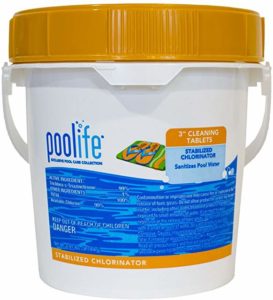Ok, you’ve decided that this is the summer you’re putting a pool in. You’ve even done your homework on which type of pool is best for your backyard, your needs and your budget. One of the next questions we hear is: “Which is better? A chlorine pool or a salt water pool?”
This is a great question and it’s becoming more and more frequent. The truth of the matter is that both options are technically chlorine pools in the end. Here’s how to explain it.
How can it be both? Is it a salt water pool or a chlorine pool?
Salt water swimming pools draw on dissolved salt in the water to produce chlorine through the use of a generator. That generator works through a process called electrolysis to break down the salt (sodium chloride) in the water. The chemical reaction created by electrolysis produces chlorine in the form of sodium hypochlorite and hypochlorous acid. Chlorine produced through this process has the same sanitizing properties as chlorine commonly found in a tablet or powdered form.

Poolife brand chlorinating 3″ tablets
For sanitation and disinfecting purposes, both salt water and chlorine pools really deliver a similar result. The most notable difference between the two comes with some of the tangential effects related to the number of chloramines in the water. Due to reduced numbers of chloramines, a salt water pool has a little nicer water feel. A little “silkier”, if you will. It doesn’t irritate the eyes as much either. In addition, salt water pools don’t have that pungent “chlorine” smell that is commonly associated with a swimming pool.
Pros of a salt water pool
Chlorine costs are generally reduced with a salt water pool because it won’t be necessary to purchase the chlorine in tablet or powdered form since the salt generator produces it. Typically, salt water pools do have a higher PH level so using a PH decreaser or muriatic acid to get the PH levels down is necessary for maintaining proper water chemistry.
Cons of a salt water pool
One downfall to salt water pools is the lifespan of the generator. This ranges around just 2-3 years and is not cheap to replace. For a traditional chlorine pool you don’t need a generator like you would for salt water. Chlorine is either administered by an inline feeder which dispenses chlorine tablets when needed so you can literally “set it and forget it” or you can manually add chlorine as needed based on water test results.
The good news is, if you’re still on the fence, you don’t have to decide right now. Although most commonly determined at the beginning of a pool project, it is possible to transform a traditional chlorine pool into a salt water pool down the road. You will want to consider, however, that pool accessories and technology may need to be adapted once you make the switch to accommodate the need to be salt resistant.
One final tip to consider: whether salt water or chlorine, if you have a big pool party, it is recommended that you shock the pool with powdered form chlorine the day after, just to be safe.
